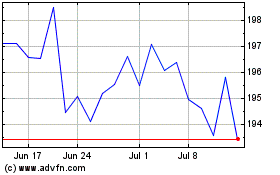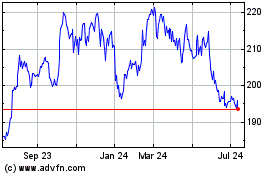CFTC's O'Malia To Oppose Proposal To Regulate Swap Trading Venues
December 09 2010 - 10:13AM
Dow Jones News
A top U.S. regulator raised concerns Thursday about a proposal
to regulate how swaps are traded, saying it could place burdens on
the industry.
Scott O'Malia, a Republican commissioner at the Commodity
Futures Trading Commission, spoke about the issue at a public
hearing Thursday where the CFTC will vote to propose the new rules
for swap trading platforms.
The CFTC's proposal would implement a key provision in the
Dodd-Frank financial law that seeks to promote pre-trade price
transparency for swaps, derivatives often used by companies to
mitigate risks such as interest-rate changes. If the agency votes
to propose it, it will be issued for public comment. A second vote
is needed to implement the rule.
The law requires that standard swap contracts traded between
major players such as banks to be executed on trading platforms.
The swaps can be traded on a traditional futures exchange like
those run by CME Group Inc. (CME). But the law also provides for an
alternative kind of platform known as a swap execution facility, or
SEF. These platforms are meant to be used by institutional
investors to help match buyers and sellers.
Numerous companies that offer swap trading today, from Tradeweb
to the interdealer brokerage firm ICAP, are all planning to apply
for "SEF" status. Some of these firms offer a "request for quote"
trading model that lets a customer request a price with the click
of a mouse to get quotes from several dealers. Others use a mix of
the computer and the telephone to help broker deals.
Many of the companies have urged the CFTC not to define a SEF
too much like a traditional exchange, which has an "open order
book" model that publicly lists bids and offers.
O'Malia said he feared the proposal is far too narrow and would
force swap execution facilities to operate too much like exchanges.
He added that he plans to oppose the draft measure.
"Staff has interpreted the minimal statutory requirements in a
manner that entirely strips away the unique characteristics of
swaps that have been bandied about the commission for at least 20
years, and requires swaps to trade like futures," he said. "To
limit swap trading to a traditional central limit order book-type
exchange may be unnecessary to mitigate systemic risk, protect the
public interest, and may, in fact, inappropriately burden
commerce."
-By Sarah N. Lynch, Dow Jones Newswires; 202-862-6634;
sarah.lynch@dowjones.com
CME (NASDAQ:CME)
Historical Stock Chart
From Jun 2024 to Jul 2024

CME (NASDAQ:CME)
Historical Stock Chart
From Jul 2023 to Jul 2024
